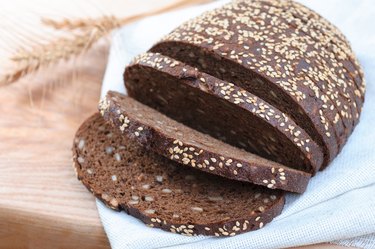
Pumpernickel, a brown bread made from coarse rye flour, features a rich, robust flavor that partners well with hearty foods such as aged cheeses and smoked salmon. For the bread to be considered true pumpernickel, it should be made from whole-grain rye flour; it's the nutritious bran and germ of the rye that give pumpernickel its rich chocolate color. When eaten in moderation, whole-grain pumpernickel — tasty, high in fiber and rich in assorted vitamins and minerals — is a healthy dietary choice.
Tip
Pumpernickel is a good source of fiber, lignans, vitamins and minerals.
Video of the Day
The Basics of Pumpernickel
According to the USDA National Nutrient Database, one slice of pumpernickel bread contains 3.00 g of protein, 0.50 g of total fat, 14.00 g of carbohydrate and 1.00 g of fiber. Pumpernickel is also cholesterol free and low in fat , with one slice containing a diet-friendly 70 calories — less than the amount found in an apple. The small amount of fat found in a slice of pumpernickel is composed mostly of heart-healthy monounsaturated and polyunsaturated fatty acids.
Video of the Day
Fiber and Lignans
The amount of dietary fiber in a single slice of pumpernickel bread is about the same as that found in 1/4 cup of raisins or 1/2 cup of brown rice — both considered good sources of fiber. Fiber can help lower your levels of unhealthy LDL cholesterol, control your blood sugar and reduce your risk of diabetes and diverticular disease. In addition, fiber promotes efficient bowel movements and creates a feeling of satiety, or fullness, which may help curb overeating. Pumpernickel is also high in natural phytochemicals called lignans, which have antioxidant and estrogen-like qualities. High intake of plant lignans is associated with a lower risk of breast cancer; research into the benefits of lignans is ongoing.
Vitamins and Minerals
Pumpernickel contains B-complex vitamins. This includes thiamin, or vitamin B-1, which is needed to produce energy in the body. It also includes niacin, or vitamin B-3, essential in nervous and digestive system health. Also present in pumpernickel is folate, in the amount of 24 micrograms (mcg) per slice; this B-complex vitamin is important in the production of red blood cells and helps prevent rare neural tube defects in newborns. Pumpernickel also provides manganese in the amount of .330 milligrams (mg) per slice; manganese helps form a potent antioxidant called superoxide dismutase, which scavenges harmful free radicals in the body. Selenium, a trace mineral essential for proper immune system function, is also present in the amount of 6.4 mcg per slice. Pumpernickel also contains the minerals calcium and magnesium, essential for the building and maintenance of strong bones, as well as iron, vital for making hemoglobin.
Pumpernickel and Diabetes
Scientific research supports the beneficial effects of whole-grain foods such as pumpernickel. According to a study published in 2013 by Diabetes Education, pumpernickel bread did not raise blood sugar or insulin levels as high as traditional white or whole grain breads, when consumed by people with type 2 diabetes.
- USDA National Nutrient Database: Pumpernickel Rye Bread
- Diabetes Education: Glycemic, Insulinemic, and Appetite Responses of Patients With Type 2 Diabetes to Commonly Consumed Bread.
- USDA National Nutrient Database: Apples, Raw, With Skin
- University of Maryland Medical Center; Manganese; June 2009
- University of Maryland Medical Center; Selenium; May 2009